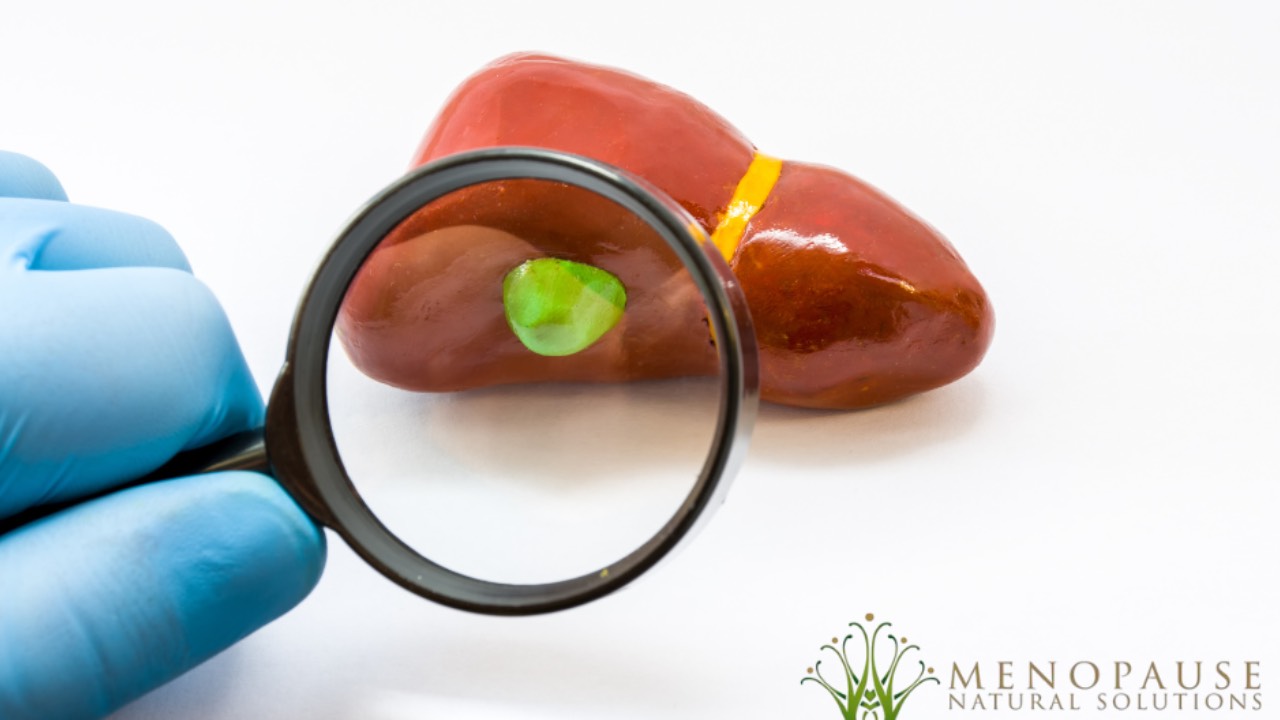What Midlife Women Need to Know About Gallbladder Health

When we talk about menopause, we often focus on hormones, hot flushes, or fatigue — but what about your gallbladder?
If you’ve been feeling bloated, sensitive to fatty foods, or struggling with sluggish digestion, your gallbladder may be calling for attention. Let’s take a closer look at why gallbladder health matters during the menopausal transition — and how to keep it functioning at its best.
What Does the Gallbladder Do?
Your gallbladder is a small, pear-shaped organ tucked beneath your liver. Its main job? Storing and concentrating bile— a fluid made by your liver to help break down and absorb fats. When you eat a meal containing fat, your gallbladder releases bile into the small intestine to assist with digestion.
Bile also plays a role in detoxification, including clearing out excess oestrogen and other waste products. So yes, your gallbladder is deeply connected to hormonal health!
How Menopause Can Affect Your Gallbladder
During perimenopause and menopause, hormone levels — especially oestrogen and progesterone — start to fluctuate and eventually decline. These changes can have a ripple effect across your digestive system, including your gallbladder.
Here’s how:
1. Slower Bile Flow
Oestrogen helps keep bile flowing freely. As levels drop, bile can become thicker and more sluggish, increasing your risk of gallstones or poor fat digestion.
2. Increased Cholesterol in Bile
Changing hormone levels can also impact how your liver processes cholesterol. When bile contains too much cholesterol and not enough bile salts, crystals can form — the building blocks of gallstones.
3. Reduced Gallbladder Motility
Slower digestion and reduced motility (the movement of muscles in your gut) can mean your gallbladder doesn’t empty as efficiently, leading to bile stasis.
Hormone Replacement and Gallstones — Is There a Link?
Yes — but it depends on the type of hormone replacement.
Oral oestrogens (like pills or tablets) have been linked to an increased risk of gallstones. That’s because they pass through the liver and can impact bile composition and cholesterol levels.
However, transdermal oestrogens (like patches, creams, or gels) appear to carry a much lower risk, as they bypass the liver.
If you’re considering HRT, and you have a history of gallbladder issues, talk to your practitioner about using transdermal options.
Signs Your Gallbladder Might Need Support
Gallbladder issues can be subtle at first, but common symptoms include:
-
Pain or discomfort in the upper right abdomen (especially after fatty meals)
-
Bloating or nausea
-
Pain between the shoulder blades
-
Floating or pale-coloured stools
-
Intolerance to fatty or fried foods
How to Support Gallbladder Function Naturally
Whether you’ve got your gallbladder or have had it removed, there are ways to encourage healthy bile flow and better fat digestion — especially during menopause.
1. Try Herbal Bitters
Herbs like dandelion, globe artichoke, greater cheladine and gentian stimulate bile flow and gallbladder contractions. A few drops before meals can support smoother digestion.
2. Don’t Fear Healthy Fats
Avoiding fats entirely can lead to bile stasis. Include healthy fats like avocado, extra virgin olive oil, flaxseeds, and oily fish to keep bile flowing.
3. Eat Choline-Rich Foods
Choline helps prevent fatty liver and supports fat metabolism. You’ll find it in eggs, liver, sunflower seeds, and lecithin.
4. Stay Hydrated
Dehydration thickens bile. Aim for 2L of filtered water daily — and consider adding electrolytes or structured water to improve absorption.
5. Support Liver Health
Bile is made in the liver, so liver health is key. Eat plenty of cruciferous vegetables (like broccoli and cauliflower), and consider nutrients like taurine, glycine, and B vitamins.
6. Consider Digestive Enzymes
If you’ve had your gallbladder removed or suspect sluggish bile flow, you might benefit from ox bile supplements or enzymes that support fat digestion.
Gallbladder Removal: What Are the Long-Term Disadvantages?
Gallbladder removal (cholecystectomy) is common — especially for women over 40 — but it comes with important considerations.
Without your gallbladder:
-
Bile flows continuously rather than being released in response to meals.
-
This can result in less efficient fat digestion, especially after larger or fattier meals.
-
It may cause diarrhoea, bloating, or fatty stool (steatorrhoea).
⚠️ But one of the most overlooked consequences is reduced absorption of fat-soluble vitamins — A, D, E, and K.
These vitamins rely on bile for proper absorption:
-
Vitamin A supports skin, vision, and immune health.
-
Vitamin D is crucial for bone density and mood.
-
Vitamin E is a powerful antioxidant, particularly protective during menopause.
-
Vitamin K is essential for blood clotting and bone metabolism.
Long-term deficiency in these nutrients may contribute to:
-
Osteoporosis or poor bone healing
-
Dry skin or poor wound repair
-
Increased oxidative stress or inflammation
-
Impaired immune function
-
Easy bruising or abnormal bleeding
If you’ve had your gallbladder removed, it’s important to monitor fat-soluble vitamin levels.
No Gallbladder? Here's How to Support Yourself
You can still live well without a gallbladder — but you may need extra support to optimise digestion and nutrient absorption.
Consider:
-
Ox bile supplements to mimic gallbladder function
-
Taurine and lecithin to keep bile fluid
-
Digestive enzymes with lipase
-
Fat-soluble vitamins to avoid deficiency
-
Regular liver support to ensure bile production remains strong
Final Thoughts
Your gallbladder is more than just a storage pouch — it plays a key role in fat digestion, hormone clearance, and nutrient absorption.
During midlife, as your hormones shift and digestive function changes, supporting your gallbladder (or compensating for its removal) can make a huge difference to your energy, skin, mood, and metabolic health.
Menopause isn’t just a hormonal story — it’s a digestive one too.
Need support with digestive health during menopause?
Book a Menopause Strategy Call to personalise your plan.


